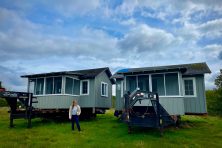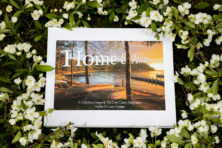Second Place – “Summer Interlude”
- Share
- Tweet
- Pin
- Share
I slammed on the brakes, the car skidded, fishtailing before coming to a stop as a large black bear lumbered across the road. My heart hammered as I stared at the bushes where the bear disappeared. The blast of a horn reminded me I had stopped in the middle of the highway. “Okay, okay,” I said to the truck speeding past me. I drove on, scanning the tree-lined roadsides for wildlife, fearing another animal would dash in front of my car. If I could only get to the cabin without incident, I could do what had to be done.
By the time I turned into the narrow drive, the sun had dropped below the horizon leaving behind a pale pink sky. Hidden in the gloom of the dense woods, the cabin seemed unfamiliar at first, like an acquaintance who has aged unexpectedly. Weeds choked the bricked path, balsam seedlings poked out around the foundation, and leaves and fallen twigs littered the cabin roof. On the lakeside, green moss covered the dilapidated wooden shed and lichens blanketed the old steel dock.
Elsewhere along the shore, new aluminum docks bobbed in the water, in anticipation of daylight and the boats, jet skis, and pontoon parties. No doubt the old neighbors are gone, I thought. It’s been so many years. The old lady’s probably gone by now, too.
That wasn’t the case. The next morning, as I lay in bed listening to birds chirping in the trees, I heard the almost forgotten creak of oarlocks and the slushy sound of water. Could it be the old woman? Every morning just after sunrise, she rowed a circuit around the small lake, passing our cabin on the way. That was more than fifteen years ago, before the divorce, before I moved several hundred miles away to another state. I was in my twenties, and she seemed old then. She must be in her seventies now, I thought.
No one really knew, but people thought she might be an artist or a well-to-do eccentric. She kept to herself. Perhaps she was a famous person turned recluse. Her reputation grew as each year’s newcomers heard about the solitary woman who rowed the lake each morning. Getting out of bed, I drew back the curtain and looked out at the water. There she was, a small figure in a baggy print dress, the familiar wide-brimmed straw hat tied under her chin. The boat glided forward, propelled by the steady rhythm of her rowing. As the boat drew abreast of my bedroom window, the rowing stopped and she stared at my cabin. I didn’t think she could see me watching her, but I felt embarrassed, as you do when staring at a stranger who suddenly turns and gives you a questioning look. After a few seconds she rowed on. Why had she stopped to stare? Unnerved, I let the curtain fall back in place…it was her, wasn’t it?
Last night’s dirty dishes lay in the sink, but I ignored them, fixed a pot of coffee, and took it outside to the patio where I’d be sheltered from the already hot summer sun.
In the past, after drinking my coffee, I’d have fixed breakfast, then gone for a long walk. But, I needed to do what I came here to do – sell the cabin. Who’d want the worn out furniture, the odd pieces of kitchenware? I looked in the old shed. The paddles stood in the corner and the aluminum canoe lay on the floor, coated with dust. Tracing and retracing my initials in the gray film, I recalled those calm evenings when the water reflected purple-red sunsets. I used to paddle offshore and sit, watching the otters returning from their fishing expeditions at the other end of the lake. Those moments of tranquil beauty disappeared within the black hole of a soured marriage.
Hoping it would still float, I dragged the canoe from the shed and pushed it into the water. Within a few minutes I was paddling with a good rhythm, tracing the old woman’s route. A half hour of paddling brought me abreast of her place, a tiny cabin hidden behind massive spruces. She sat on her dock, a fishing rod lying across her lap. She was watching a dark object wriggling in the water. It submerged, surfaced a moment later, wriggled some more. It might be an otter, I thought. Perhaps they still swam up and down the lake, fishing as they went along. I always loved them, nature’s children, diving and then rolling onto their backs, holding food in their paws. If it was an otter, I hoped it wasn’t injured.
Suddenly an adult eagle appeared, its head and tail feathers glaring white against the intensely blue sky. I watched, horrified, as it swooped down and grabbed the animal with its talons. After several unsuccessful attempts to take flight, the eagle loosened its grip and flew away.
The old woman looked at me, then back at the struggling creature. It might be an otter. Should I try to rescue it? I was about to ask for the old woman’s advice, when the eagle attacked again. Still unable to lift the animal, the bird began paddling with its huge wings, attempting to drag its catch to shore. When a boat pulling a water skier raced past, the frightened bird flew away. The injured creature wobbled in our direction and I saw its huge dorsal fin and tail. Relieved it wasn’t an otter, I nevertheless felt sorry for the helpless fish.
Then my beloved otters appeared, diving and surfacing as they made their way down the lake. Within seconds, one of them spotted the injured fish, circled it, and then dragged it underwater. The others quickly joined in. Seconds later they surfaced, holding hunks of fish in their mouths. They dove underwater again and swam out of sight.
The old woman looked at me and said, “Big Walter, the musky. He’s a legend around here. He broke plenty of my fishing lines.” With that, she rose from her chair, turned, and disappeared behind the spruce trees.
For years Big Walter had outwitted fishermen. Then, in his final moments, he had avoided becoming the eagle’s lunch, only to be killed by the otters. It seemed unfair. But, it’s no use wondering why things turn out as they do. You make the best of it and keep going, I guess. No doubt the old lady would go right on fishing off her dock for another Big Walter. I was happy for the otters, though. We all deserve a break once in a while.
The sun appeared from behind the trees lining the shore, sending blinding white rays flashing off the water. It was time to relax in the shade, make use of the string hammock stored in the shed. Later on I could go out again, maybe catch the otters returning. I turned the canoe and paddled toward home.
Mary Lu Perham holds degrees in police science, psychology and speech communication. She has worked as a security officer, welder, carpenter, horse-drawn carriage driver, taught university classes, community education workshops, and coordinated programs for non-profit organizations. Her writing background includes creative nonfiction, journalism, and fiction. She is currently retired.
Judge’s Comments:
Beginning almost as a love letter to the north woods, this story unfolds reflective and quiet as the scene of the cottage on a lake described within it. A subtle darkness flows through the piece, never fully exposed, which makes it gripping up to the last sun-on-the-water image.



